Divine Intervention
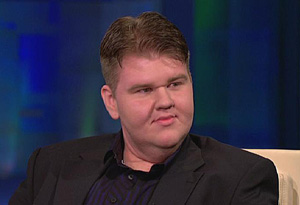
Addictions have the power to rip families apart, ruin lives and, in some cases, end a person's life. When it comes to addiction, Oprah says it seems that everyone is struggling with something.
Over the past five years, addicts have exposed their dependencies to shopping, food, sex, pills, gambling, rage, alcohol, heroin and more on A&E's gripping series Intervention. Each week, millions tune in to see the life-and-death situations these addicts find themselves in and watch as the people who love them tackle the issues head-on. Each episode ends with a dramatic, last-chance confrontation—supervised by an interventionist—and the chance to go to a free, inpatient treatment facility for 90 days.
Since its premiere, Intervention has become more than a hit TV show. Producers say 77 percent of people they've confronted on camera are clean today.
Josh, a 24-year-old morbidly obese man, says he was eating himself to death before he appeared on Intervention. "Eating is something that everybody does, and yet, I do it where it makes my life completely miserable," he said.
Morbid obesity is defined as being 100 pounds overweight. When A&E's cameras arrived at his home, Josh weighed 547 pounds—that's 360 pounds heavier than his ideal weight. "I can't believe that I let myself get to this point," Josh said.
While the average adult usually eats about 2,000 calories a day, Josh said he used to consume 5,000 to 8,000 calories every day. "People say: 'Why can't you just not eat it? Why can't you just put it down?'" he said. "I don't know how to."
Over the past five years, addicts have exposed their dependencies to shopping, food, sex, pills, gambling, rage, alcohol, heroin and more on A&E's gripping series Intervention. Each week, millions tune in to see the life-and-death situations these addicts find themselves in and watch as the people who love them tackle the issues head-on. Each episode ends with a dramatic, last-chance confrontation—supervised by an interventionist—and the chance to go to a free, inpatient treatment facility for 90 days.
Since its premiere, Intervention has become more than a hit TV show. Producers say 77 percent of people they've confronted on camera are clean today.
Josh, a 24-year-old morbidly obese man, says he was eating himself to death before he appeared on Intervention. "Eating is something that everybody does, and yet, I do it where it makes my life completely miserable," he said.
Morbid obesity is defined as being 100 pounds overweight. When A&E's cameras arrived at his home, Josh weighed 547 pounds—that's 360 pounds heavier than his ideal weight. "I can't believe that I let myself get to this point," Josh said.
While the average adult usually eats about 2,000 calories a day, Josh said he used to consume 5,000 to 8,000 calories every day. "People say: 'Why can't you just not eat it? Why can't you just put it down?'" he said. "I don't know how to."
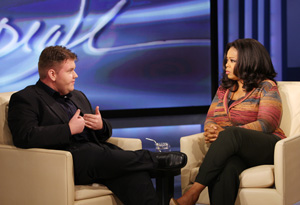
Photo: Courtesy of A&E Television Networks
As Josh's weight increased, everyday activities became laborious tasks. He says it was hard to move, let alone exercise, and he was running out of options. "I tried the diets. I tried the pills. I tried going and doing water aerobics at the YMCA with the old ladies," he says. "I tried it all...I couldn't do it."
Diets weren't working, but Josh's family members and ex-girlfriend hoped inpatient rehabilitation might. Worried about his health and well-being, Josh's loved ones decided to team up with an intervention specialist and confront Josh in a hotel room. A&E's cameras filmed their emotional pleas. "As much as I love you, your eating scares me," said Rex, Josh's father. "You are following my footsteps at an earlier age."
After the intervention, Josh told his family he was ready to change. "I've lived like this for too long," he said. That day, Josh walked out of the hotel room and checked into rehab.
Diets weren't working, but Josh's family members and ex-girlfriend hoped inpatient rehabilitation might. Worried about his health and well-being, Josh's loved ones decided to team up with an intervention specialist and confront Josh in a hotel room. A&E's cameras filmed their emotional pleas. "As much as I love you, your eating scares me," said Rex, Josh's father. "You are following my footsteps at an earlier age."
After the intervention, Josh told his family he was ready to change. "I've lived like this for too long," he said. That day, Josh walked out of the hotel room and checked into rehab.
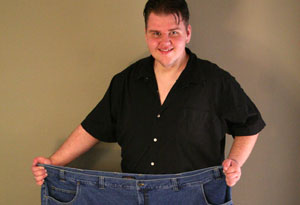
Armed with lessons he learned in rehab, Josh has lost 259 pounds—half his body weight—in two years. He believes the popular A&E series helped save his life. "I think Intervention gave me an opportunity that I wouldn't have had otherwise," he says. "I don't know if I'd be alive today if it weren't for them."
Josh says rehab's structured environment helped him adhere to a strict diet, but the healing process really began after he addressed issues that were making him want to eat. "They gave me a way to work through the emotional side of it," he says. "I dealt with my pain and my emotional hurt by stuffing it down with food—the same way that an alcoholic drinks, the same way that a drug addict uses."
Early on in treatment, Josh says he learned that secrets will keep you sick, so he made the decision to reveal a part of himself he'd been hiding since he was 7 years old. Josh came out as a gay man to his family and friends.
Josh says rehab's structured environment helped him adhere to a strict diet, but the healing process really began after he addressed issues that were making him want to eat. "They gave me a way to work through the emotional side of it," he says. "I dealt with my pain and my emotional hurt by stuffing it down with food—the same way that an alcoholic drinks, the same way that a drug addict uses."
Early on in treatment, Josh says he learned that secrets will keep you sick, so he made the decision to reveal a part of himself he'd been hiding since he was 7 years old. Josh came out as a gay man to his family and friends.
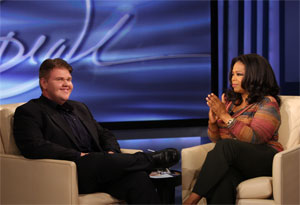
For years, Josh says he's been hiding his true self behind his weight. "I had so many different facades," he says. "I come from a very conservative Christian background, and I felt like if I was my true self, I was going to let down my church. I was going to let down my parents. I was going to be kicked out of my house. I felt like my whole life was going to reject me, and so I hid behind the fat guy."
When Josh told his father he's gay, Josh says he could hear the disappointment in his father's voice. "I just felt like I had let [my parents] down," he says.
Despite their initial reactions, Josh says his parents are learning to accept his sexuality, and he has no regrets. "If I didn't come clean about that, I was never going to get well," he says. "And, from that point forward, I started getting honest about everything. And you know what? Today, I'm real. I'm real, and not everybody accepts me, and I know that. But the people who do love me, love me for the real me."
When Josh told his father he's gay, Josh says he could hear the disappointment in his father's voice. "I just felt like I had let [my parents] down," he says.
Despite their initial reactions, Josh says his parents are learning to accept his sexuality, and he has no regrets. "If I didn't come clean about that, I was never going to get well," he says. "And, from that point forward, I started getting honest about everything. And you know what? Today, I'm real. I'm real, and not everybody accepts me, and I know that. But the people who do love me, love me for the real me."

On another episode of Intervention, Leslie, a mother of three, said she was once a social drinker who rarely had too many. During the first 40 years of her life, Leslie said she got drunk just nine times. Now, there are too many times to count.
At age 40 or 41, Leslie said she started drinking heavily and, over the years, became consumed by an alcohol addiction. "I had a girlfriend, and she'd come over in the afternoons and we would drink," she said. Within a year, Leslie was drinking several bottles of wine a day.
At first, Craig, her husband of many years, said he didn't know she was intoxicated. Then, he began to notice changes in her behavior. Craig and Leslie began arguing more often, and Leslie stopped doing the household cooking, cleaning and laundry. "Two of her friends came to me, and they told me that they thought Leslie had a drinking problem," Craig said. "I was shocked."
Leslie said she'd sometimes start drinking at 6 a.m. and keep going until 11 a.m., when she had to pick up her daughter, Margo, at preschool. The drinking escalated from there. When she hit rock bottom, Leslie was drinking two pints of vodka a day and chugging mouthwash to get drunk.
At age 40 or 41, Leslie said she started drinking heavily and, over the years, became consumed by an alcohol addiction. "I had a girlfriend, and she'd come over in the afternoons and we would drink," she said. Within a year, Leslie was drinking several bottles of wine a day.
At first, Craig, her husband of many years, said he didn't know she was intoxicated. Then, he began to notice changes in her behavior. Craig and Leslie began arguing more often, and Leslie stopped doing the household cooking, cleaning and laundry. "Two of her friends came to me, and they told me that they thought Leslie had a drinking problem," Craig said. "I was shocked."
Leslie said she'd sometimes start drinking at 6 a.m. and keep going until 11 a.m., when she had to pick up her daughter, Margo, at preschool. The drinking escalated from there. When she hit rock bottom, Leslie was drinking two pints of vodka a day and chugging mouthwash to get drunk.
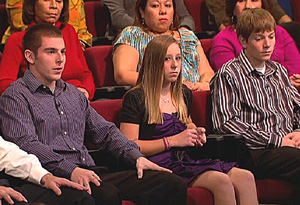
By the time an A&E addiction specialist got involved, Leslie had completed several treatment programs, but she never made it more than a few years without a relapse. "My life has spiraled downhill from the woman that I used to be, the woman that I'm capable of being, the woman that I want to be," she said.
Usually, children aren't allowed to be part of the intervention process, but in Leslie's case, her interventionist made an exception. "I've been doing this a long time, and I can tell you that I usually never allow children to be a part of this process. It's too painful," said Candy Finnigan, the interventionist. "I could have never done this without your children. They are the mainstay of why today you should make a decision to never drink again."
Cale, Leslie's oldest son, pleaded with his mother to get help. "Mom, your alcoholism has affected my life negatively. When you drink, it makes me feel embarrassed," he said. "The alcoholism has taken away the old loving mom."
Leslie agreed to enter another rehabilitation facility, and she now says she's sober for one and a half years.
Usually, children aren't allowed to be part of the intervention process, but in Leslie's case, her interventionist made an exception. "I've been doing this a long time, and I can tell you that I usually never allow children to be a part of this process. It's too painful," said Candy Finnigan, the interventionist. "I could have never done this without your children. They are the mainstay of why today you should make a decision to never drink again."
Cale, Leslie's oldest son, pleaded with his mother to get help. "Mom, your alcoholism has affected my life negatively. When you drink, it makes me feel embarrassed," he said. "The alcoholism has taken away the old loving mom."
Leslie agreed to enter another rehabilitation facility, and she now says she's sober for one and a half years.

When Leslie looks back at her Intervention episode, she's says she's devastated by the pain she's caused her family and reminded of what she's lost. Her ex-husband, Craig, now has custody of their three children.
"Through my relapses and perpetual relapsing in alcoholism, I lost everything," she says. "I became homeless. I became indigent. I lost my profession. I lost my family. I lost my marriage. I lost all my finances. I lost my home. I lost my dignity. I lost my self-worth."
Leslie says she didn't realize while she was drinking how her addiction affected the people she loved most. "The only thing important to me was to get that next drink of alcohol," she says. "Every day, I live with the pain of the fact that my husband took my children, and I drank and caused that."
Leslie says she's trying to move forward and live a sober life, but she urges other women struggling with alcoholism to get help before it's too late. "You don't need to live in that pain or that shame," she says. "Alcoholism does not define who I am. That does not make Leslie who she is. ... There's help out there for you."
"Through my relapses and perpetual relapsing in alcoholism, I lost everything," she says. "I became homeless. I became indigent. I lost my profession. I lost my family. I lost my marriage. I lost all my finances. I lost my home. I lost my dignity. I lost my self-worth."
Leslie says she didn't realize while she was drinking how her addiction affected the people she loved most. "The only thing important to me was to get that next drink of alcohol," she says. "Every day, I live with the pain of the fact that my husband took my children, and I drank and caused that."
Leslie says she's trying to move forward and live a sober life, but she urges other women struggling with alcoholism to get help before it's too late. "You don't need to live in that pain or that shame," she says. "Alcoholism does not define who I am. That does not make Leslie who she is. ... There's help out there for you."
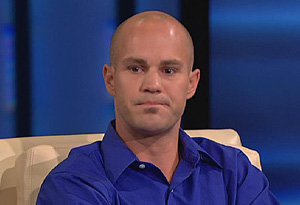
When A&E cameras began following Jason, an addict from Littleton, Colorado, he was injecting heroin and cocaine into his body up to eight times a day. To support his habit, Jason panhandled on the street or borrowed money from his devoted parents, Gerry and Kathy, and his sister.
There was a time, however, when Kathy thought of her son as the perfect child and the love of her life. As a student at Columbine High School, Jason was a star athlete who ran with the "cool" crowd. Though he experimented with marijuana and cocaine during his teenage years, his downward spiral didn't begin until 10 months after he finished his senior year of high school.
On April 20, 1999, students Eric Harris and Dylan Klebold embarked on a massacre at Jason's high school. Twelve of his former classmates and one teacher were murdered during this cold, calculated attack.
"A big reason for their rebellion was because of the jocks in '98, saying that we picked on them and that we were bullies," Jason said. "I know I was a bully in high school."
Wracked with sadness, shame and guilt, Jason amped up his drug use and sank deeper into addiction.
Then, after years of worrying about Jason's safety, his family teamed up with Jeff VanVonderen, one of A&E's intervention specialists, to convince Jason to enter a drug treatment facility. He agreed.
There was a time, however, when Kathy thought of her son as the perfect child and the love of her life. As a student at Columbine High School, Jason was a star athlete who ran with the "cool" crowd. Though he experimented with marijuana and cocaine during his teenage years, his downward spiral didn't begin until 10 months after he finished his senior year of high school.
On April 20, 1999, students Eric Harris and Dylan Klebold embarked on a massacre at Jason's high school. Twelve of his former classmates and one teacher were murdered during this cold, calculated attack.
"A big reason for their rebellion was because of the jocks in '98, saying that we picked on them and that we were bullies," Jason said. "I know I was a bully in high school."
Wracked with sadness, shame and guilt, Jason amped up his drug use and sank deeper into addiction.
Then, after years of worrying about Jason's safety, his family teamed up with Jeff VanVonderen, one of A&E's intervention specialists, to convince Jason to enter a drug treatment facility. He agreed.
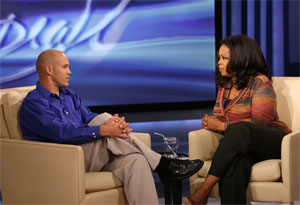
Jason is now 11 months sober. As he looks back at his intervention, he says he's finally able to feel the love his family shared.
"Right now is actually the first time that I've actually really broken down and started really feeling my emotions ," he says. "I've never really taken it to heart and soul, especially when they did my intervention. I was so high that I couldn't cry or express any kind of emotion."
Jason is also starting to open up about what happened during his high school years instead of hiding behind drugs. "I didn't know [the Columbine shooters] personally. But, to be honest, I did pick on them, and we knew who they were," he says. "They were the outcasts of Columbine High School."
Now, Jason says he uses his pain and his past to motivate him to stay clean. "I don't want to bring myself to that low again or hurt myself or hurt my family or anybody around me again," he says.
Within the next year, Jason hopes to become a diving instructor. "It gives me my own high of excitement and learning," he says.
"Right now is actually the first time that I've actually really broken down and started really feeling my emotions ," he says. "I've never really taken it to heart and soul, especially when they did my intervention. I was so high that I couldn't cry or express any kind of emotion."
Jason is also starting to open up about what happened during his high school years instead of hiding behind drugs. "I didn't know [the Columbine shooters] personally. But, to be honest, I did pick on them, and we knew who they were," he says. "They were the outcasts of Columbine High School."
Now, Jason says he uses his pain and his past to motivate him to stay clean. "I don't want to bring myself to that low again or hurt myself or hurt my family or anybody around me again," he says.
Within the next year, Jason hopes to become a diving instructor. "It gives me my own high of excitement and learning," he says.



